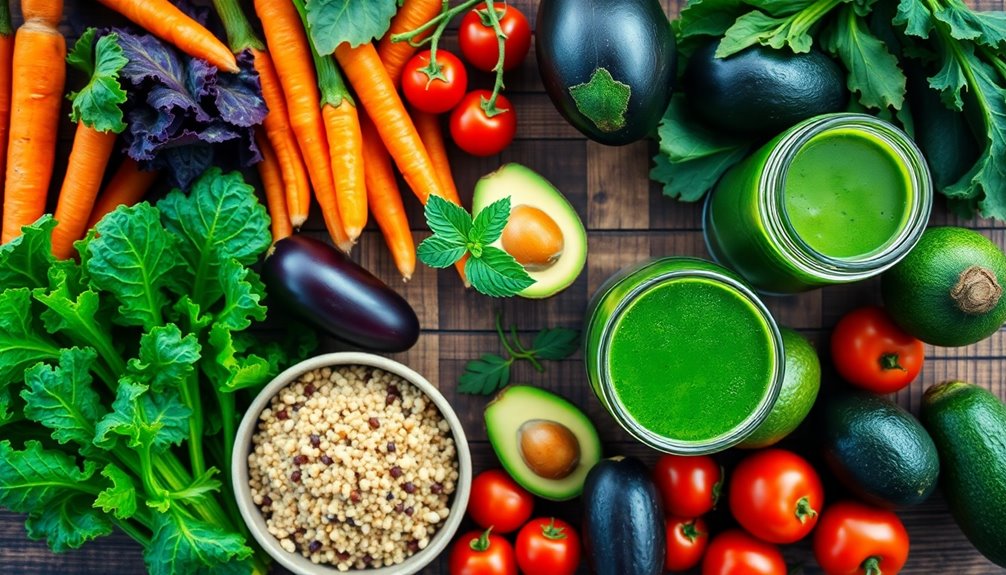A vegetarian diet emphasizes plant-based foods such as fruits, veggies, legumes, and whole grains. You'll discover it's connected to reduced risks of chronic illnesses and can enhance your heart health. Including a range of protein sources like nuts and seeds is crucial to fulfill your nutritional requirements. You may have concerns about nutrients like vitamin B12 and iron, but numerous plant-based foods can aid in increasing your intake. Furthermore, this way of living supports sustainability and nurtures a feeling of belonging. If you're interested in various types of vegetarian diets and advice for making a shift, there's more to delve into.
Key Takeaways
- A vegetarian diet can lower the risk of chronic diseases and improve heart health through increased intake of plant-based foods.
- Essential nutrients like protein, iron, and vitamin B12 can be obtained from legumes, nuts, seeds, and fortified plant products.
- There are various types of vegetarian diets, including vegan, lacto-vegetarian, and flexitarian, each with different restrictions on animal products.
- Transitioning to a vegetarian lifestyle can be gradual, allowing for exploration of diverse vegetarian cuisines and dishes.
- Vegetarian diets promote sustainability and reduce animal suffering, fostering a sense of community among individuals with similar values.
Benefits of a Vegetarian Diet
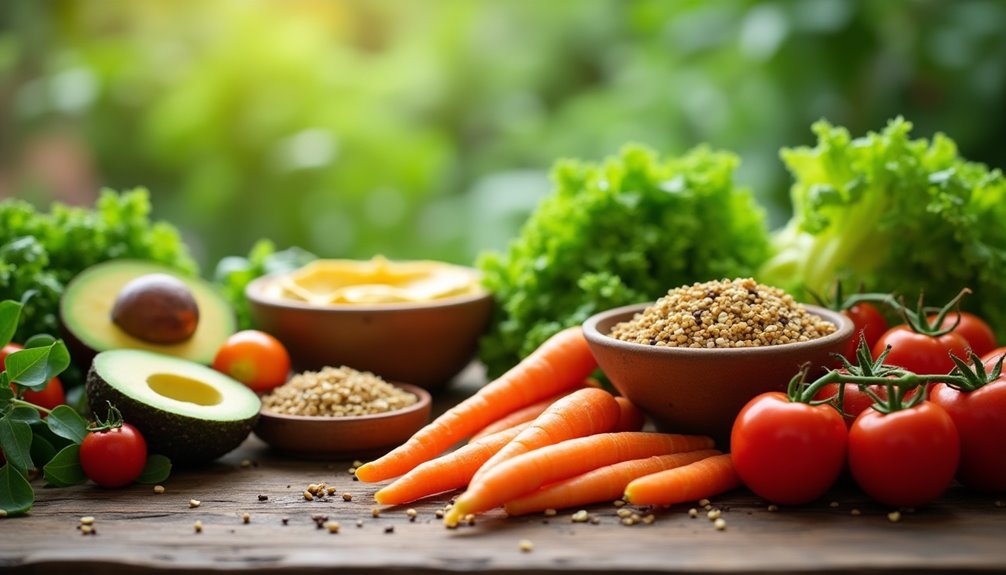
A growing number of people are discovering the numerous benefits of a vegetarian diet. One of the most compelling aspects of adopting this lifestyle is the array of health benefits it offers. Research consistently shows that vegetarian diets are linked to lower risks of chronic diseases, including heart disease, hypertension, and certain cancers. By opting for plant-based foods, you're likely to consume more fiber, vitamins, and antioxidants, which can enhance your overall well-being. Additionally, incorporating more plant-based foods into your diet can lead to lower cholesterol levels and improved heart health.
Beyond the health advantages, many individuals choose vegetarianism for ethical reasons. You might resonate with the idea that reducing animal suffering and promoting sustainability aligns with your values. By choosing a vegetarian diet, you're taking a stand against factory farming practices, which often involve inhumane treatment of animals. This choice can foster a sense of community among like-minded individuals who share your commitment to ethical living.
Moreover, embracing a vegetarian lifestyle opens up opportunities for connection with others. Many social groups, restaurants, and online communities celebrate plant-based eating, allowing you to share recipes, experiences, and support with fellow vegetarians. This sense of belonging can make your journey towards a vegetarian diet not just a personal choice, but a shared experience filled with camaraderie and inspiration.
Nutritional Considerations
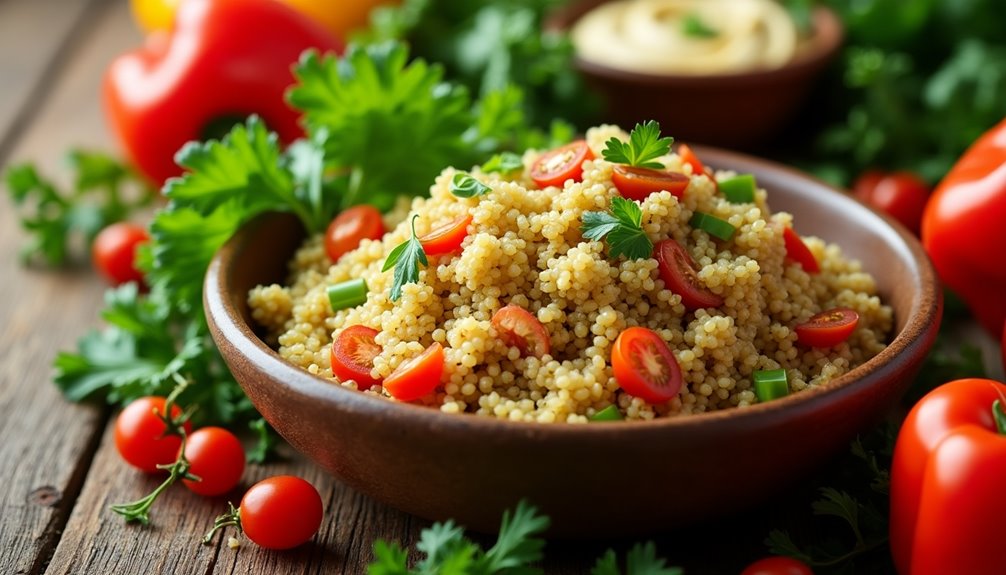
Choosing a vegetarian diet comes with significant nutritional considerations that can impact your overall health. While embracing plant-based eating can be rewarding, it's important to ensure you're meeting your protein sources and micronutrient needs.
Protein is a vital building block for your body, and as a vegetarian, you can meet your protein requirements through various plant-based options. Incorporate legumes, nuts, seeds, and whole grains into your meals. Foods like lentils, chickpeas, quinoa, and tofu not only provide protein but also offer other essential nutrients. Homemade vegan smoothies can also be a great way to boost your protein intake.
Combining different protein sources throughout the day can help make sure you're getting all the necessary amino acids your body needs.
Micronutrient needs are another significant aspect of a vegetarian diet. Certain vitamins and minerals, such as vitamin B12, iron, calcium, and omega-3 fatty acids, are often less abundant in plant foods. To address this, consider fortified foods or supplements, especially for vitamin B12.
Include a variety of dark leafy greens, fortified plant milks, and seeds like flax or chia to boost your intake of essential nutrients.
Staying mindful of your nutritional choices will support your health on this journey. By focusing on diverse food options and being aware of your dietary needs, you can thrive on a vegetarian diet while enjoying the sense of community that comes with it. Embrace the journey, and remember that you're not alone in managing these considerations.
Common Misconceptions
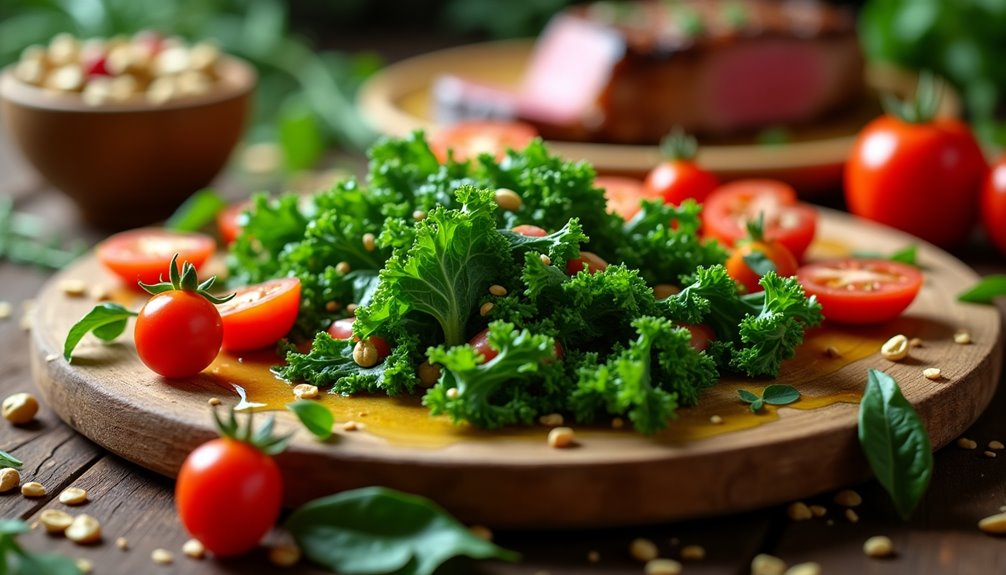
Despite the increasing popularity of vegetarian diets, several misconceptions still persist, often leading to confusion about their health benefits and practicality. One common myth is that vegetarians can't get enough protein. In reality, there are numerous plant-based protein sources available. Lentils, chickpeas, quinoa, and tofu can provide ample protein to meet your dietary needs.
Another misconception revolves around health concerns. Some believe that a vegetarian diet leads to deficiencies in essential nutrients. However, with mindful planning, a vegetarian diet can be nutritionally complete. Including a variety of foods is crucial to make sure you're receiving all the vitamins and minerals your body requires.
Here are a few misconceptions to keep in mind:
- All vegetarians are unhealthy: Many people assume vegetarians eat only salads, but a balanced vegetarian diet can include whole grains, fruits, vegetables, and healthy fats.
- Vegetarians can't build muscle: With the right protein sources and strength training, vegetarians can effectively build muscle just as well as their meat-eating counterparts.
- Vegetarian diets are expensive: Plant-based foods like beans and rice are often more affordable than meat, making a vegetarian diet accessible for many budgets. Additionally, a vegetarian diet can help reduce the risk of chronic diseases, allowing for a healthier lifestyle overall.
Types of Vegetarian Diets
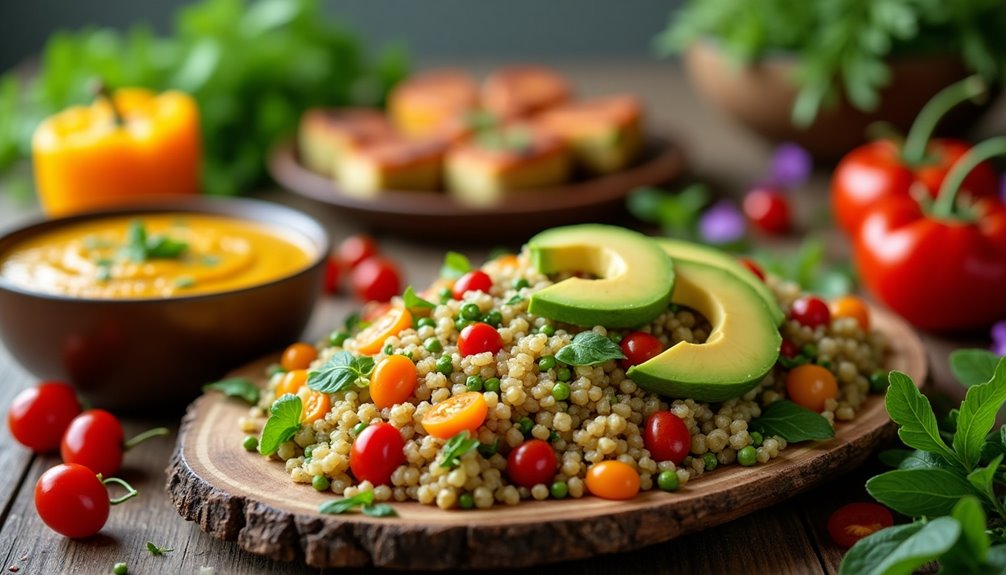
Understanding the various types of vegetarian diets can help you make informed choices that align with your health goals and lifestyle. There are several classifications within the vegetarian spectrum, each with its own unique characteristics.
At the core, you'll find the distinction between vegan vs. vegetarian. Vegans eliminate all animal products, including meat, dairy, and eggs. This approach emphasizes plant-based foods, which can lead to numerous health benefits, such as lower cholesterol and improved heart health. On the other hand, vegetarians generally avoid meat but may include eggs and dairy, allowing for a broader range of nutrients.
If you're looking for flexibility, consider flexitarian options. This diet encourages a primarily plant-based approach but allows for occasional meat consumption. It's perfect for those wanting to reduce their meat intake without completely eliminating it.
Here's a quick overview of the main types of vegetarian diets:
| Type | Description |
|---|---|
| Vegan | Excludes all animal products (meat, dairy, eggs) |
| Vegetarian | Excludes meat but may include dairy and eggs |
| Flexitarian | Primarily plant-based with occasional meat intake |
Incorporating a plant-based diet can also contribute to a longer, healthier life.
Transitioning to a Vegetarian Lifestyle
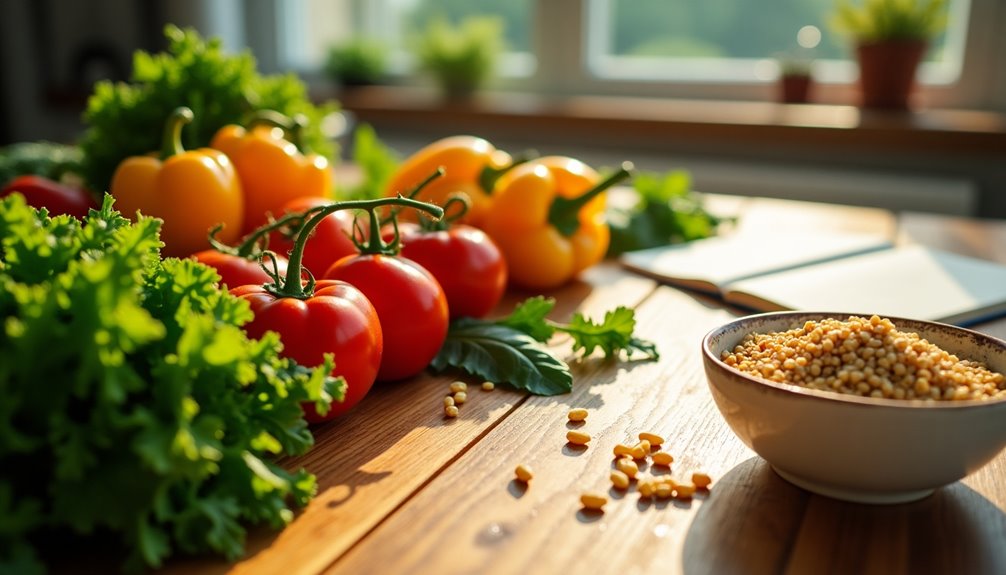
Many people find shifting to a vegetarian lifestyle to be a rewarding and fulfilling adventure. It's a chance to explore a world of delicious flavors while also being mindful of health and the environment. To make the shift smoother, it's crucial to approach it with a plan and an open mind.
Start by gradually incorporating more plant-based options into your diet. You don't have to make a sudden change; instead, consider these steps:
- Explore diverse cuisines: Many cultures have rich vegetarian dishes that can spark ideas for your meals.
- Experiment with new ingredients: Try using quinoa, lentils, or chickpeas to add protein and variety to your meals.
- Gather recipe ideas: Look for cookbooks, blogs, or social media accounts that focus on vegetarian cooking.
As you embrace this lifestyle, remember that it's perfectly normal to have questions or feel overwhelmed at times. Focus on what you enjoy and gradually replace meat-based meals with vegetarian alternatives. You'll discover a new world of flavors and textures along the way. In fact, studies show that many who adopt a vegetarian diet experience improved overall health, which can enhance your journey.
Don't hesitate to seek out communities, whether online or in-person, where you can share experiences and gather support. You're not alone in this journey, and many are excited to share tips, recipe ideas, and encouragement. Making the shift to a vegetarian lifestyle can be a beautiful journey; embrace it with curiosity and creativity!
Meal Planning Tips

As you explore vegetarianism, effective meal planning can help you maintain a balanced diet and reduce the stress of daily cooking. Start by creating a weekly menu that incorporates a variety of fruits, vegetables, whole grains, legumes, nuts, and seeds. This not only guarantees you get all the essential nutrients but also keeps meals exciting and diverse.
When grocery shopping, make a list based on your planned meals. This will help you avoid impulse buys and secure that you have all the ingredients you need to whip up nutritious dishes. Consider shopping for seasonal produce, as it's often fresher and more affordable. Don't forget to include pantry staples like canned beans, lentils, and grains, which can serve as the foundation for many meals.
Incorporating different cooking techniques can also enhance your vegetarian dishes. Experiment with roasting vegetables to bring out their natural sweetness, or try stir-frying for quick, flavorful meals. Steaming can preserve nutrients while keeping your ingredients vibrant. Batch cooking is another great method; prepare larger portions of grains, soups, or stews, and store them for quick access throughout the week.
Lastly, don't hesitate to seek out vegetarian communities for ideas and support. Access to online support community can provide valuable resources and encouragement as you navigate your vegetarian journey. Sharing recipes and cooking tips with others can inspire you and help you feel more connected on your vegetarian journey. With some planning and creativity, you'll find that vegetarian meal prep can be both enjoyable and rewarding.
Overcoming Challenges
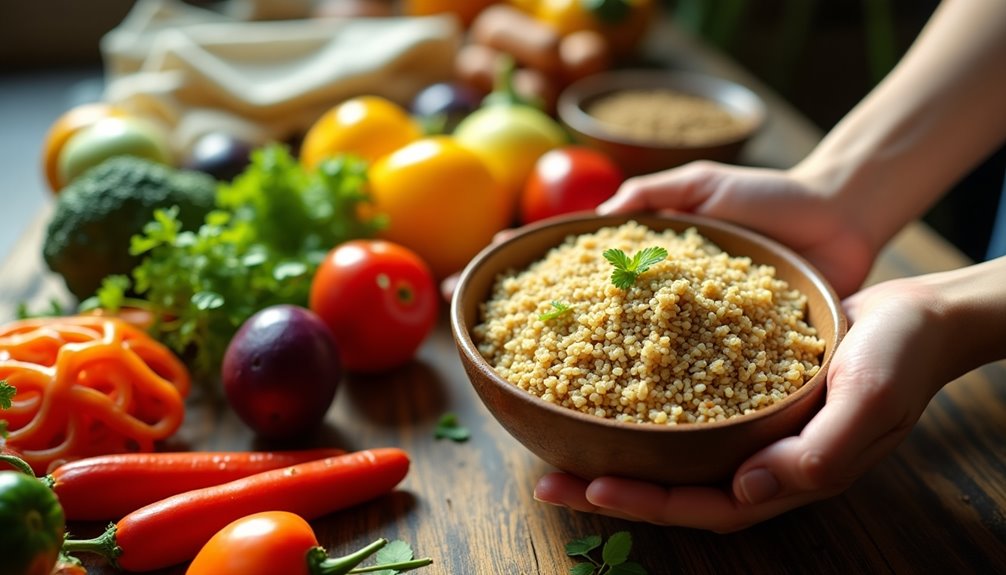
Adopting a vegetarian diet can come with its own set of challenges, but recognizing and addressing these obstacles can lead to a more fulfilling experience. One of the most common issues you might face is dealing with social situations. Friends and family may not always understand your dietary choices, which can lead to awkward moments during gatherings. Communicating your needs openly can help bridge this gap and foster understanding.
Traveling abroad can also present obstacles. Different cultures have varying levels of vegetarian options, and it's essential to plan ahead. Here are some tips to help you overcome these obstacles:
- Research local cuisine: Before your trip, look into the traditional dishes of your destination. You'll be surprised by the vegetarian options available in many cultures.
- Learn key phrases: Knowing how to ask for vegetarian meals in the local language can make a significant difference when dining out.
- Bring snacks: Always pack a few vegetarian snacks for long journeys or when options are limited.
Ultimately, flexibility is key. While it's important to stick to your dietary choices, allowing yourself some leeway can make social interactions and travel experiences more enjoyable. Remember, you're not alone in this journey. Many people are embracing vegetarianism, and sharing your experiences can create a sense of community. Additionally, adopting a vegetarian diet can also support improved liver function, which is crucial for overall health. By facing these obstacles head-on, you'll likely find that your commitment to a vegetarian lifestyle becomes both enriching and rewarding.
Impact on the Environment
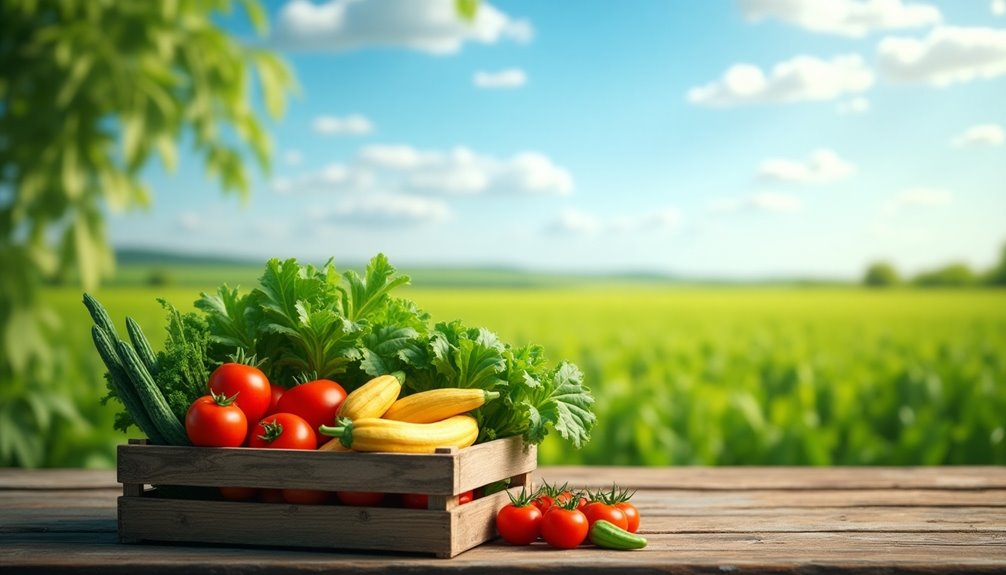
The impact of a vegetarian diet on the environment is substantial and well-documented. By selecting plant-based foods over meat, you can greatly decrease your carbon footprint. Studies indicate that livestock farming contributes nearly 14.5% of global greenhouse gas emissions, which is akin to the emissions produced by all the cars, trucks, and planes combined. When you choose vegetarian meals, you're essentially making a decision that supports a healthier planet.
Furthermore, embracing a vegetarian diet often aligns with sustainable agriculture practices. Many plant-based foods require less land and water than meat production. For example, producing one pound of beef demands approximately 1,800 gallons of water, while vegetables and grains require much less. By supporting sustainable agriculture, you also promote biodiversity, as diverse cropping systems help sustain healthy ecosystems.
It's crucial to acknowledge that not all vegetarian diets are created equal. Some processed vegetarian foods can still have a high environmental impact. Focus on whole, minimally processed foods to maximize the benefits of your dietary choices. Unique training strategies that prioritize whole foods can assist in making more environmentally friendly dietary choices.
In the end, when you embrace a vegetarian diet, you're not only making a personal health decision but also engaging in a broader movement toward environmental stewardship. This collective endeavor can lead to significant changes in food systems, decrease pollution, and combat climate change. By being part of this community, you nurture a sense of belonging among others who share your values, driving a positive impact on the world around you.
Resources for Further Learning
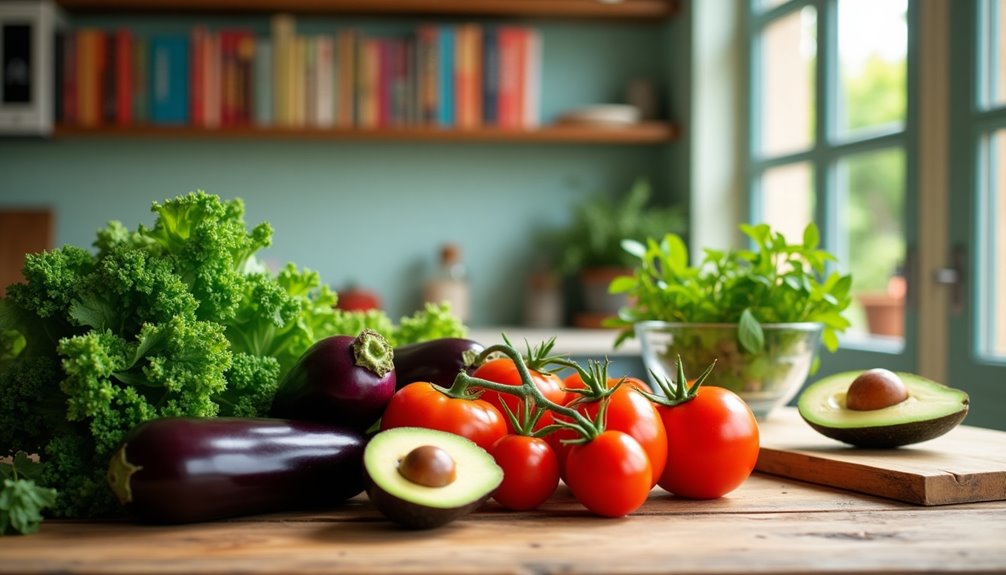
Exploring a vegetarian diet opens up a wealth of resources that can enhance your understanding and commitment to this lifestyle. Whether you're new to vegetarianism or looking to deepen your knowledge, various tools and communities are available to support you. Engaging with these resources can provide you with essential cooking techniques and recipe inspiration, making your journey not just easier but also more enjoyable. Additionally, you might find it beneficial to explore delicious, easy-to-make recipes that focus on flavor and health.
Here are some valuable resources to explore:
- Cookbooks: Look for vegetarian cookbooks that offer a variety of recipes and techniques. Authors like Isa Chandra Moskowitz and Yotam Ottolenghi provide innovative ideas to keep your meals exciting.
- Online Communities: Joining forums or social media groups can connect you with like-minded individuals. You can share tips, ask questions, and find support as you navigate this lifestyle.
- Cooking Classes: Many local culinary schools or community centers offer vegetarian cooking classes. These can help you master essential cooking techniques and introduce you to new ingredients.
Frequently Asked Questions
Can a Vegetarian Diet Help With Weight Loss?
A well-planned diet can be a powerful tool for weight management. By focusing on whole foods like fruits, vegetables, and whole grains, you're likely to consume fewer calories while still achieving nutritional balance. Research shows that such diets can promote satiety, helping you feel full longer.
Plus, they often provide essential nutrients that support overall health. So, if you're looking to shed some pounds, consider how your food choices can make a difference.
Is It Safe for Children to Be Vegetarian?
Yes, it's safe for children to be vegetarian if you guarantee they meet their nutritional needs. Focus on providing a balanced diet rich in protein, iron, calcium, and vitamins. Growth concerns can arise if their diet lacks essential nutrients, so planning is key. Incorporating a variety of foods, like legumes, whole grains, and leafy greens, can help maintain their health and support proper growth. Always consult a healthcare provider for personalized advice.
How Do I Handle Social Situations as a Vegetarian?
Handling social situations can be tricky, but you can navigate them smoothly. When dining out, check menus ahead of time or suggest restaurants with vegetarian options.
At family gatherings, communicate your dietary preferences kindly and offer to bring a dish you love. This way, you're included and can share your favorite meals.
Are There Vegetarian Options for Athletes?
When you think of elite athletes like Serena Williams or Tom Brady, you mightn't picture them thriving on plant-based diets. Yet, vegetarian options can meet your nutritional needs effectively.
Foods like quinoa, lentils, and tofu provide essential proteins and minerals, supporting your performance impact. Research shows that with careful planning, you can excel in your sport while enjoying a diverse diet.
It's all about finding what fuels your body best and connects you with like-minded individuals.
Can a Vegetarian Diet Affect Mental Health?
A diet can greatly impact your mental well-being and cognitive function. Research shows that nutrient-rich foods boost brain health, enhancing mood and focus. If you're mindful of your nutrient intake, you can maintain a balanced diet that supports your mental health.
Incorporating foods high in omega-3 fatty acids, antioxidants, and vitamins can help. It's crucial to listen to your body and make sure you're getting the nutrients you need for peak mental performance.
Conclusion
In the words of Gandhi, "You must be the change you wish to see in the world." Embracing a vegetarian diet not only benefits your health but also contributes to a more sustainable planet. By understanding the nutritional aspects, debunking myths, and planning your meals, you can navigate this lifestyle with ease. Remember, every small step counts, and with the right resources and mindset, you can thrive as a vegetarian while making a positive impact on the environment.

